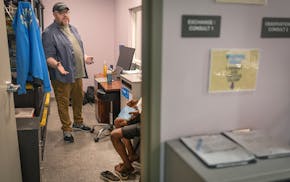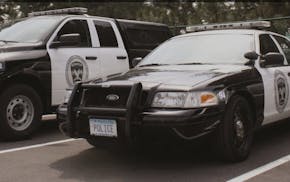Following a flurry of activity and speculation, Democratic presidential nominee Kamala Harris chose Minnesota Gov. Tim Walz as her running mate Tuesday.
In a matter of weeks, Walz, 60, has catapulted from relative obscurity to the national stage to become a cable news and meme favorite. But what are his takes on the issues that matter to voters across the country?
Here are Walz's policy positions on seven major issues.
Israel-Hamas
Following the October Hamas attack in Israel, Walz ordered all U.S. and Minnesota flags to fly at half-staff at all state buildings. His office encouraged individuals, businesses and more to join in mourning and honoring the victims of the attacks.
"We will continue to stand in solidarity with Minnesota's Jewish and Israeli community and work with the State Department to ensure the safety of Minnesotans at home and abroad," Walz said in a news release.
He has condemned hostility toward Jewish students on college campuses and has called for increased Holocaust education.
When DFL voters in Minnesota came out in support of the "uncommitted" effort that aimed to signal discontent about the handling of the war in Palestine to President Joe Biden, Walz noted how important civic engagement is to Minnesotans in an interview on CNN.
"The situation in Gaza is intolerable. I think trying to find a solution, a lasting two-state solution, certainly the president's move toward humanitarian aid and asking us to get to a ceasefire, that's what they are asking to be heard and what they should be doing," Walz said in March.
Abortion rights
Walz signed legislation into law last year enshrining a "fundamental right" to abortion in state law. Minnesota Democrats fast-tracked the bill after the U.S. Supreme Court's reversal of Roe v. Wade in 2022.
"The message that we're sending to Minnesota today is very clear: Your rights are protected in this state," Walz said last January. "You have the right to make your own decisions about your health, your family and your life."
Book bans
Walz signed a bill establishing a "Library Bill of Rights" that mandated that libraries cannot restrict access to material "because of partisan or doctrinal disapproval."
The law explicitly does not limit the rights of parents or guardians to decide which books their children can check out. The bill also does not charge any agency with enforcement, but enables "any person injured" by a library or school board decision to sue and have the decision reversed. A court may also require that board to pay $5,000 if it's found in violation.
Free school lunches
Minnesota became the third state in the nation where school meals are free for all public and charter school students, regardless of family income. The law was part of a broader proposal aiming to make Minnesota "the best state in the country to raise a child."
"This is the assurance that no one falls through the cracks because a busy parent didn't fill out a form," Walz said in March.
LGBTQ rights
Last year, Walz signed bills into law seeking to protect LGBTQ people, including a long-sought-after bill banning conversion therapy, the discredited practice of trying to change a person's sexual orientation or gender identity, on minors and vulnerable adults.
Another law passed last year takes a sanctuary state approach to LGBTQ issues, shielding families and children traveling to Minnesota for gender-affirming care from legal repercussions such as extradition orders from other states.
Guns and public safety
New public safety laws went into effect last year including expanded background checks and what is commonly known as a "red flag law," allowing law enforcement and family members to petition for an extreme risk protection order if someone with a firearm is believed to be a danger to themselves or others.
After the murder of George Floyd, Walz signed the Minnesota Police Accountability Act that banned chokeholds and 'warrior style' training. The law also included reforms to the Police Officer Standards and Training (POST) Board.
Immigration issues
Walz signed a bill known as Driver's Licenses for All into law that restored license requirements to pre-2003 rules, when access to a driver's license did not hinge on immigration status. Proponents of the law said the change opened up additional opportunities for the estimated 80,000 unauthorized immigrants in Minnesota, who face challenges getting to work or school.
Climate and environment
As governor, Walz made a series of moves that progressives viewed as major wins, like a law passed last year that requires a carbon-free electric grid by 2040, increasing spending on climate-friendly energy and making it easier for wind and solar farms to secure permits. But he disappointed environmental advocates on decisions about mining, Enbridge's Line 3 pipeline, ag pollution and more.

Meth makes comeback in Minnesota in more dangerous and record ways

Four arrested, no one injured in fighting and shooting following Burnsville High School graduation

One man dead in shooting Friday outside Northtown Mall in Blaine
